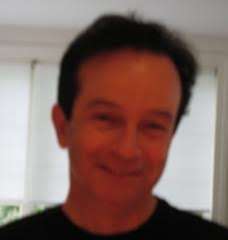The Boston Lyric Opera’s production of The Threepenny Opera opens with a promising mix of menace and savagery. Two huge klieg lights hang from the flies; a harsh light illuminates the caramel wood paneling of the unit set’s high walls. Macheath sits downstage right, his t-shirt stained with blood, robotically sharpening a formidable Bowie knife and staring straight out at the audience. Dressed in long coats with high, Dracula-esque collars, the rest of the cast stands with their backs to the house, while Tiger Brown sings the “Moritat”, methodically stabbing, strangling and otherwise dispatching them until only he and Mack remain alive at the ballad’s end. Unfortunately, that Bowie knife disappears: no one wields anything more threatening for the rest of the afternoon than a barely discernible switchblade. With it goes the sharp, cutting edge Brecht and Weill’s “play with music” demands.
Christopher Burchett, whippet-thin with his alt-right undercut and thousand-yard stare, has the reptilian appearance of a murderer/rapist but not the demeanor. Staging choices undermine his character’s power and centrality. Why, for example, if he is onstage during the Prologue? Doesn’t he commit the choreographed murders – which, after all, are his – instead of Brown? Interactions with his gang border on the slapstick, with Mack behaving more like an exasperated sitcom father corralling his unruly children than a suave and sinister crime boss. Peachum’s venality is similarly blunted. Many of his most pointed lines fail to lacerate. Perhaps these muted portrayals are the director’s riff on Brechtian alienation? Whatever the intention, they are a miscalculation which leaves a void and muffles the play’s impact.
The females fare far better, as does Weill’s music. James Maddalena’s funereal Peachum should take his cue from Michelle Trainor’s brassy, unapologetically amoral portrayal of his spouse. Kelly Kaduce’s Polly Peachum – genetically engineered from the combined DNA of Betty Boop and Cyndi Lauper – wears what looks like one of Meow Meow’s cast-off wigs and transforms the traditionally naive Polly into a lubricious Kewpie doll who spices her dialogue with the vocal fry, upspeak and random inflections of a contemporary young woman: a Kardashian in a camisole. Her passive-aggressive meeting of the minds over a weaponized sheet cake with Chelsea Basler’s flustered Lucy crackles with the subversive energy lacking elsewhere.
David Angus provided tart accompaniment for his adroit singers, using Stephen Hinton and Edward Harsh’s edition published in 2000 along with English lyrics by Michael Feingold. The original production had an orchestra of seven playing 23 different instruments. Angus used 11 with Brett Hodgdon on keyboards outstanding. There were no weak links vocally speaking either. Burchett had the heft and range to handle Macheath’s more operatic and rhapsodic outbursts as the hour of his execution approached and Kaduce brought the same variety of expression in her spoken part to her singing. Renée Tatum’s warm, seductive mezzo encompassed the complex and often conflicting emotions of Jenny Driver, wryly purring the faux lullaby of the “Solomon Song”, and Chelsea Basler made a comic meal of “Lucy’s Aria” – Weill’s parody of a mad scene – singing it straight and brilliantly.
Kurt Weill asserted that “If the framework of opera is unable to withstand the impact of the age, then this framework must be destroyed.” That subversive strain of iconoclasm, so crucial to both his and Brecht’s conception of The Threepenny Opera, was conspicuous in the music and the singing. If more of the cast could mine the same vein in their acting, this would be a production to reckon with.




